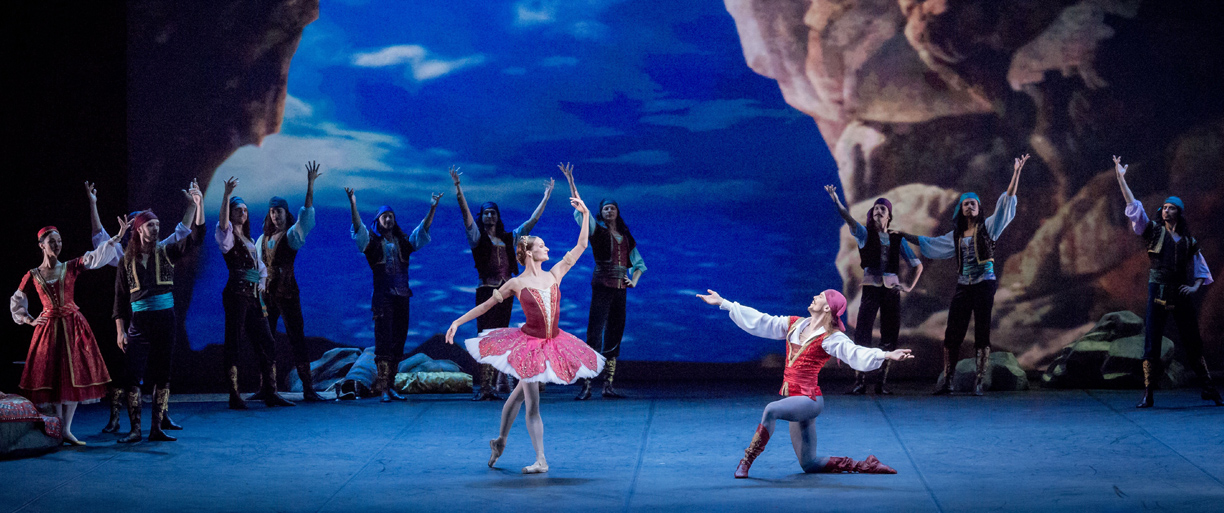“The ballet is the setting for some of the most sophisticated choreography, and the Mikhailovsky dancers address it with joyous precision.” The Guardian newspaper covers Mikhail Messerer’s revised version of the legendary ballet.

Le Corsaire
ballet in three acts
music by Adolphe Adam, Cesare Pugni, Léo Delibes, Ludwig Minkus, Riccardo Drigo, Pyotr Oldenburgsky, Ivan Trubetskoy, Antoine Simon

Cast





This ballet, inspired by Byron’s poem, tells the story of the love between a pirate and a beautiful slave-girl. The action takes place against the backdrop of the open sea, in remote grottoes, amid the hustle and bustle of an eastern bazaar, and the languid luxury of a sultan’s harem. The duels and kidnappings are thrilling, but it is Marius Petipa’s timeless choreography that really delights. This romantic, oriental masterpiece, first performed in Russia in 1858, has been returned to the repertoire by the Mikhailovsky Theatre’s Ballet Master in Chief, Mikhail Messerer.
Oriental bazaar. The merchants are examining exotic goods. Beautiful slave girls are here for sale, too. A group of corsairs led by Conrad appear in the bazaar square. Medora, the ward of slave trader Lanquedem, comes to the balcony. Seeing Conrad, she quickly makes a selam — a bouquet in which each flower has a special meaning — and throws it to Conrad. Medora leaves the balcony and appears in the square accompanied by Lanquedem.
Seyd-Pasha is brought in his palanquin to the bazaar: he wants to buy new slave girls for his seraglio. The girls demonstrate their art of dancing. Medora arrests Pasha’s eye and he decides to buy her at any cost. Medora is horrified by the bargaining between Lanquedem and Pasha. Conrad assures Medora that he won’t let anyone hurt her.
On Conrad’s signal, the corsairs abduct the slave girls and Medora. Conrad orders to kidnap Lanquedem, too.
Act II
Conrad brings Medora to his seaside grotto. The couple is happy. Conrad’s friend, Birbanto, brings in Lanquedem, who is shivering with fear, and the slave girls, who beg Conrad to let them go. Medora implores Conrad to set the girls free, and he gives them freedom. Birbanto and his associates are displeased with Conrad’s decision: they claim the slave girls. Furious Conrad affirms his decision. Birbanto threatens Conrad, but the pirate is adamant, and the slave girls hasten to escape.
Infuriated Birbanto attempts to stub the leader of the corsairs. A fight ensues in which Conrad puts Birbanto to his knees and takes the frightened Medora away.
Lanquedem appears. Birbanto offers him freedom in return for a reasonable amount of money. The slave trader swears that he is poor and can’t pay for his freedom. The corsairs snatch off his hat, frock and belt, discovering hidden diamonds, pearls and gold. The frightened Lanquedem comes up with the idea to give a sleeping potion to Conrad, and Birbanto orders him to do it. Lanquedem sends Conrad poisoned wine. He drinks it and immediately falls asleep. Medora in vain tries to wake him up.
A stranger appears, in whom Medora recognizes Birbanto. She tries to escape him but is surrounded by the conspirators. Trying to defend herself, Medora stabs Birbanto in the wrist with Conrad’s dagger but is abducted by Lanquedem. Conrad wakes up. He is distraught.
Act III
Seyd-Pasha’s palace on the coast of the Bosporus. Pasha’s odalisques entertain themselves with dances. Eunuchs bring a tray with exotic fruits, and the women quarrel over who gets what.
Pasha orders odalisques to stop their disputes. Carried away by the youth and beauty of his favourite odalisque Gulnare, Seyd-Pasha presents her with his handkerchief, but she throws it on to her friends; eventually the handkerchief, passing from hand to hand, reaches an old odalisque who smothers Seyd-Pasha with her caresses.
The slave trader’s arrival is announced to Pasha. It’s Lanquedem, who is bringing Medora wrapped in a shawl. Pasha is thrilled to see her. Gulnare welcomes the new girl.
A servant tells Pasha that a caravan of pilgrims on their way to Mecca are asking for shelter. Pasha welcomes them in. During the evening prayer the mock dervish by stealth removes his false beard, and Medora recognizes Conrad. Pasha orders his odalisques to entertain the guests with dancing.
Conrad and his friends throw off all disguise, threatening Pasha with weapons. Pasha runs from the palace. The corsairs win the battle against the palace guards.
Gulnare is asking for Conrad’s help to get away from Birbanto, who has been chasing her. Conrad, moved by her tears, protects her. Birbanto retreats. Seeing him, Medora tells Conrad about Birbanto’s betrayal. Birbanto swears that he has never betrayed Conrad but Medora points at his wounded wrist. Birbanto suddenly attacks Conrad, attempting to kill him but is shot by him.
Sea bay. Conrad and Medora get aboard the ship waiting for them and sail off to new adventures.
Première of the production: 8 September 2015
Libretto by Jules Henri Vernoy de Saint Georges revised by Mikhail MessererChoreography by Marius Petipa and Konstantin Sergeyev revised by Mikhail Messerer
Choreographic fragments by Jules Perrot, Alexander Gorsky, Pyotr Gusev
Staged by Mikhail Messerer
Musical Director of the production: Pavel Klinichev
Musical Director’s Assistant: Valentin Bogdanov
Sketches of the Sets: Vyacheslav Okunev
Costume Designer: Tatiana Yastrebova
Lighting Designer: Alexander Kibitkin
Ballet Master’s Assistant: Anna Razenko
Principal Pianist: Natalia Spichka
Video: Victoria Zlotnikova



